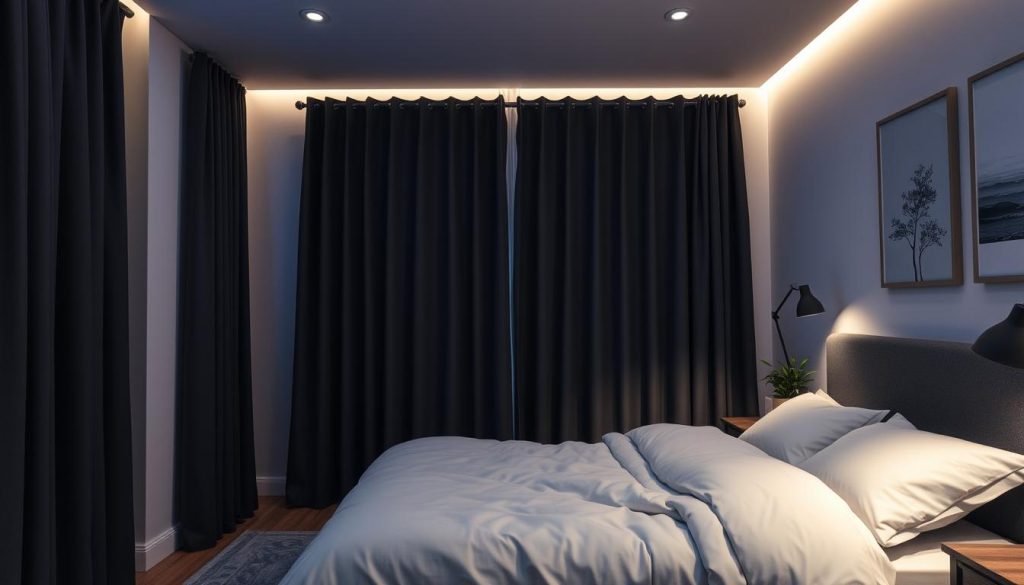Working shifts can really mess with your body’s natural rhythm. It’s key to understand how your circadian rhythm works to stay healthy. When you work odd hours, it can mess up your sleep. Finding ways to manage your sleep is vital.
Looking into how shift work affects your body’s clock can help. I want to share tips that make living with a non-traditional schedule easier. These health tips can help you sync your life with your body’s natural rhythm.
Understanding My Circadian Rhythm
To understand my circadian rhythm, it’s key to see it as my body’s internal clock. It controls my sleep and wake times over a 24-hour cycle. The National Sleep Foundation says my rhythms change with light and dark.
Knowing how this cycle works helps me see its role in my energy and health.
What is Circadian Rhythm?
The circadian rhythm is like a natural timer for my body. It affects my sleep and when I release hormones. It needs light to work right; natural light in the day helps keep it in sync.
But, if it gets disrupted, it can mess with my sleep and mood.
Importance of Circadian Rhythm in Daily Life
The role of my circadian rhythm in daily life is huge. It affects my health, thinking, and mood. The American Psychological Association says keeping a regular rhythm is key for being at my best.
By planning my day with my rhythm in mind, I can find a better balance. This leads to better sleep, more energy, and a more stable mood.

| Aspect | Description | Impact on Life |
|---|---|---|
| Circadian Rhythm | Natural internal process that regulates sleep-wake cycles. | Essential for maintaining health and well-being. |
| Biological Clock | Internal mechanism influenced by external light cues. | Affects energy levels and alertness throughout the day. |
| Daily Habits | Routine activities structured around my circadian rhythm. | Improves efficiency and overall satisfaction with life. |
| Sleep Cycles | Phases of sleep regulated by circadian rhythms. | Influences cognitive functioning and physical recovery. |
How Shift Work Disrupts My Body Clock
Shift work brings many challenges that affect my body clock. The irregular hours can disrupt my sleep quality and quantity. It’s important to understand these changes to manage my well-being.
Effects of Shift Work on Sleep Patterns
Shift work deeply impacts my sleep patterns. I find it hard to fall asleep or stay asleep. The Sleep Research Society notes that many shift workers face insomnia or excessive sleepiness.
This disruption of my natural rhythm makes it hard for my body to adjust. I experience fragmented sleep and constant fatigue.
Physical and Mental Health Consequences
Shift work poses health risks in many ways. Physical issues like cardiovascular diseases, obesity, and gastrointestinal problems can occur. These problems arise from my body’s struggle with irregular sleep.
Mental health issues like anxiety and depression also become more common. These conditions often link to the fatigue I face every day. It creates a tough cycle to break.

| Health Risks | Physical Symptoms | Mental Health Issues |
|---|---|---|
| Cardiovascular Diseases | High Blood Pressure | Anxiety |
| Obesity | Weight Gain | Depression |
| Gastrointestinal Problems | Stomach Irritation | Stress |
Strategies for Managing Circadian Rhythm and Shift Work
Managing my circadian rhythm while working shifts is a big challenge. I focus on my sleep environment and schedule to improve sleep quality. These strategies help me deal with the tough parts of shift work.
Creating a Sleep-Friendly Environment
Having the right sleep environment is key for good sleep. The American Sleep Association offers tips that help me sleep better. Important tips include:
- Keeping the bedroom dark with curtains or masks.
- Keeping it cool, between 60-67°F.
- Reducing noise with machines or earplugs.
These changes in my sleep space help me sleep deeper and regulate my schedule. A good sleep environment greatly improves my rest.
Establishing a Consistent Sleep Schedule
Keeping a regular sleep schedule is very helpful, even on days off. It helps my body adjust better. To manage my time well and sleep better, I do the following:
- Going to bed and waking up at the same times every day.
- Avoiding long naps that can mess up my night sleep.
- Using sleep apps to track my sleep and make changes.

By focusing on these strategies, I manage my circadian rhythm well, even with shift work. A good sleep environment and a strict schedule are the basis for better sleep and health.
The Role of Light Exposure in Circadian Rhythms
Working shifts has taught me how vital light exposure is for my circadian rhythm. Natural light tells my body when to wake up and when to sleep. Studies from the Sleep Foundation show sunlight boosts my mood and helps me sleep better at night.
By sitting near windows or going for walks, I use natural light to regulate my sleep. This helps me stay in sync with my body’s natural rhythm.
Using Natural Light to Regulate My Body Clock
Using natural light in my daily routine is key for better sleep. Morning sunlight resets my internal clock. This helps my body make melatonin at the right times, leading to better sleep at night.
Whether it’s eating breakfast by a sunny window or taking a quick break outside, these actions help me stay in sync with natural light.
Artificial Light and Its Effects
On the other hand, artificial light can mess with my circadian rhythm. The blue light from screens—like phones, tablets, or computers—stops melatonin production. This makes it tough to fall asleep.
Reducing artificial light in the evening is essential. Dimming lights or using blue light filters helps create a sleep-friendly environment. Being aware of both natural and artificial light helps me keep a healthy sleep-wake cycle, even with shift work.

